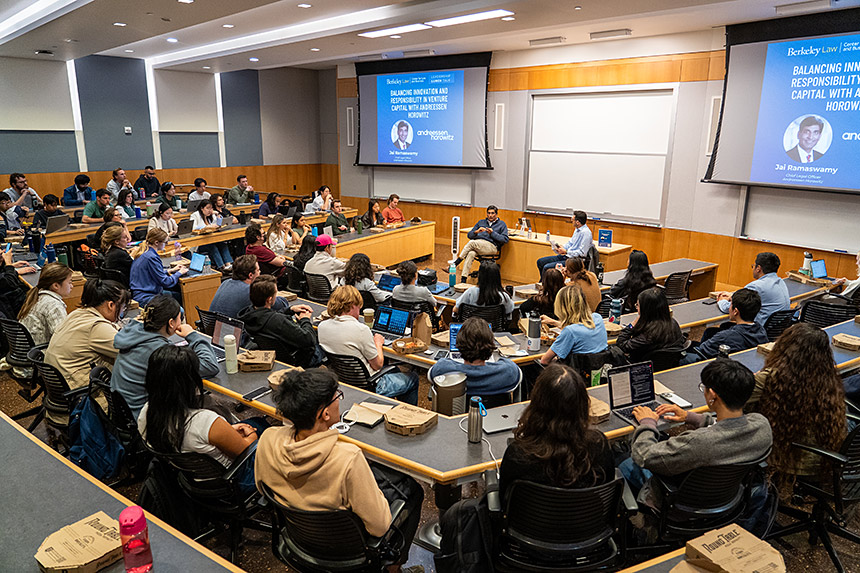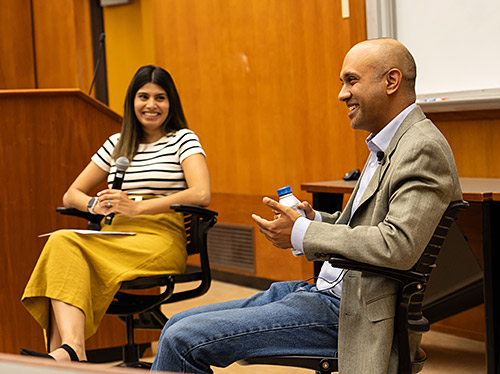
By Andrew Cohen
The lineup reads like an all-star roster of legal department leaders at major organizations, from Microsoft and Instacart to Asana and the San Francisco Giants. A major jewel in Berkeley Law’s treasure trove of business offerings, the Leadership Lunch Series twice a week offers students valuable insights on in-house lawyering.

Presented by the school’s Berkeley Center for Law and Business and Berkeley Business Law Journal, the series features expert professors interviewing chief legal officers, general counsels, and other giants at prominent companies — and leaving ample time for student questions.
“The Leadership Lunch Series introduces first-year law students to the idea of themselves as future corporate leaders,” says Angeli Patel ’20, the center’s executive director. “It’s one of the key moments that shapes their early impressions of business law.
“When chief legal officers and general counsel from top companies share their unconventional paths and emphasize taking risks, it broadens our students’ vision of what a legal career can be. We want them to see that their career doesn’t have to follow a straight path or stay confined to the law — they have a place in the business world, and they can lead it.”
Preaching humility and flexibility
The series also showcases some Berkeley Law alums who have paved a productive business law path. Jonathan Palmer ’93, general counsel and corporate vice president at Microsoft, joined the company in 2010 and now leads its corporate legal affairs team.
“Being the head of litigation at a company is a great job if you’re interested in learning new things literally every day,” he said when interviewed by Professor Stavros Gadinis. “You’re working with different parts of the company all the time, which I really like.”

Palmer oversees litigation, trade, employment matters, corporate governance, and internal investigations at one of America’s most iconic companies — half the size when he joined as it is now. As technology advanced, Microsoft began offering more services and now has to factor more business and legal risks into its decision making.
Citing privacy and artificial intelligence (AI) as dominant topics in his work, Palmer noted the current patchwork of regulatory regimes and the challenges that presents to product design and development.
“Law school prepares you for all kinds of jobs because it teaches you to take a set of tools, apply them to a fact situation, and figure out which tools you need to solve a problem. I’m doing that every day,” said Palmer, who also maintains a robust pro bono practice. “But don’t underestimate life experience. Law is not an academic endeavor — it’s fundamentally a practical and a human endeavor.
“It’s about persuading people you’re right and solving real practical problems affecting real people, whether you’re advising a big company or working on asylum cases at the border. Life experience matters, because that’s what gives you the judgment and perspective you’ll need.”
Fall 2024 Leadership Lunch Series Speakers
• San Francisco Giants Chief Legal Officer Jack Bair
• Alibaba Group Chief Legal Officer Albert Liu
• Asana General Counsel Eleanor Lacey
• Hims & Hers Chief Legal Officer Soleil Boughton
• Instacart General Counsel Morgan Fong ’00
• Zendesk Chief Legal Officer Shana Simmons ’09
• 1906 – Nuka Foods General Counsel Shabnam Malek
• Microsoft General Counsel Jonathan Palmer ’93
• Waymo Chief Legal Officer Amar Mehta
• Toast Chief Diversity, Equity & Inclusion Officer Angela Roseboro
• Rothy’s Chief Legal Officer Marie Satterfield
• Andreesson Horowitz Chief Legal Officer Jai Ramaswamy
• Whatnot General Counsel John Orta
Palmer readily admitted that AI will change the role of lawyers — but he believes for the better. He sees AI performing rudimentary, time-consuming tasks in the area of document review and information synthesis that new lawyers routinely spend countless hours slogging through.
“There will be some disruption and law firms will have to adjust to the new economics of that, but I think it’ll help the profession quite a bit,” Palmer said. “There’s a reason we call AI a co-pilot and not an autopilot. It’s not going to replace the fundamental judgment and common sense lawyers have to bring to bear every day. Get good and confident at using AI tools, because they’ll make you much more productive and efficient.”
Climbing the corporate ladder
Shana Simmons ’09, chief legal officer at Zendesk, advised students aspiring to in-house counsel positions to be diligent, opportunistic, and flexible. Like Palmer, who worked in Hong Kong as managing partner of a law firm’s Asia-based offices, she spent three years out of the country gaining corporate experience for a firm in London.
“I’m from the Bronx, I’ve got a little swagger in me, but I also have empathy and the end goal when coming to terms on a deal is that both parties leave feeling good about it,” Simmons said. “That empathetic approach allows me to advocate effectively.”
Interviewed by Professor Frank Partnoy, she now manages a team of about 100 at Zendesk, a customer ticketing platform that leverages generative AI. The company has over 1.8 billion tickets in its system, and offers myriad tools to enhance customer service.

A former senior counsel at Google, Simmons urged students to connect rather than compete. “Spend time making relationships with each other,” she said. “You’re each other’s future clients and colleagues. You’re going to school with some of the best future lawyers nationwide, so later in your work when you have a tax question or an IP question, you’ll want to call these people.”
Simmons described the delicate balancing act in-house counsel perform of pursuing innovation and facilitating growth while mitigating risk and providing transparency to customers. She also warned against the idea that strong leadership requires a strong persona.
“I made some mistakes managing people because of that notion,” she said. “You have to spend time inspiring people and building trust with them. You can’t just come in and strongly execute a set vision. A big misstep managers make is acting like they always have to be right. That said, not everyone has to like you. I just try to be consistent with my approach, clear with my guidance, and fair with my feedback.”
In closing, Simmons advised veering away from strategic self-promotion and focusing instead on legal, personal, and communication skills.
“It’s not about going to every networking event,” she said. “It’s about being a good person, trying to do a good job, and not making the same mistake more than twice. Don’t spend so much time on LinkedIn that it takes away from doing your actual work and doing it well.”